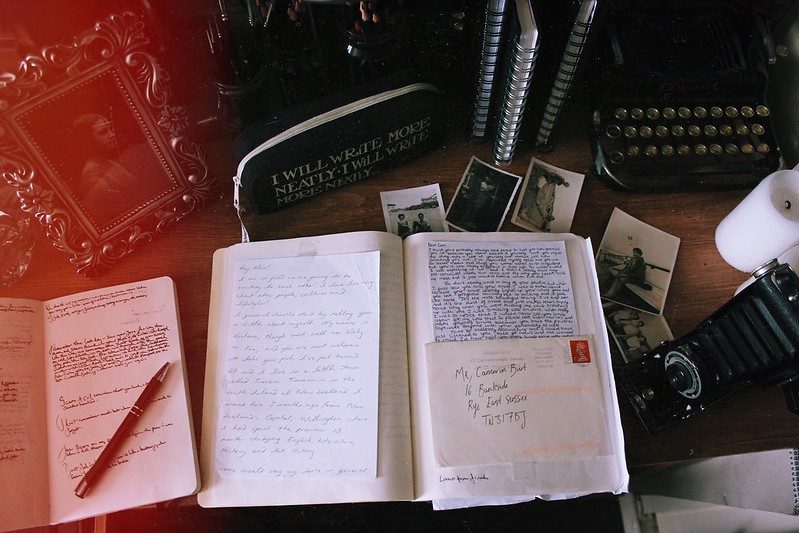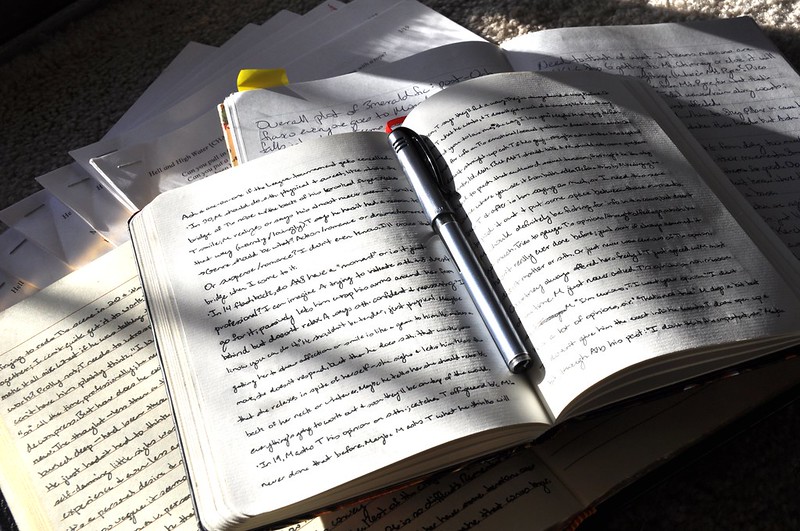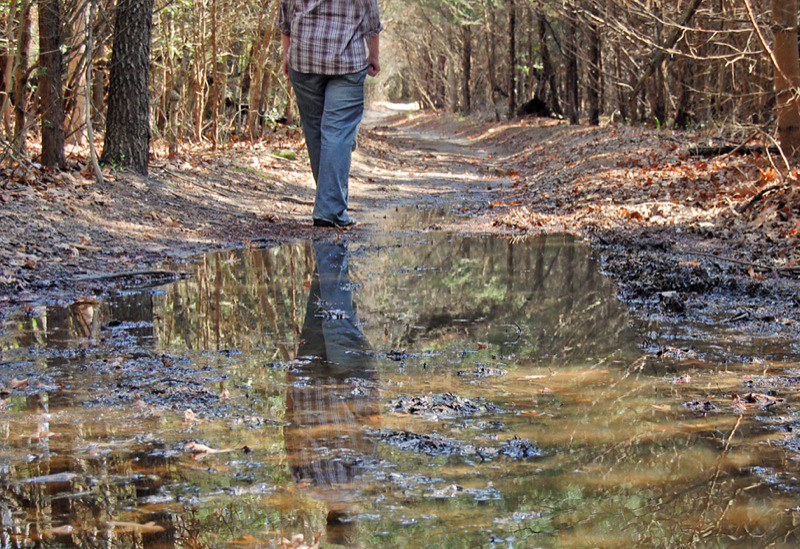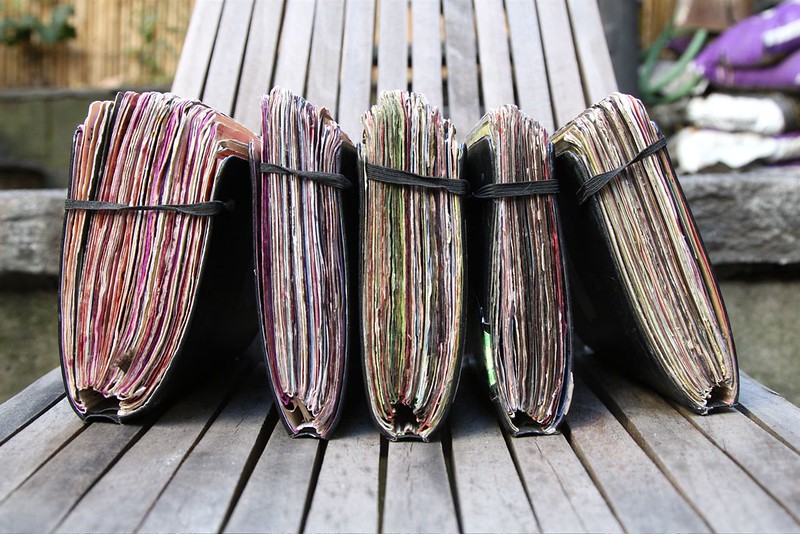
JOURNALING 201 (Mind-Mining)
Journal-keeping and diary writing – tracking daily events and happenings in some sort of record book – has been going on for centuries. Except for wanna-be smarty-pants and wise guys (i.e., the “intelligentsia”), poets and writers and Creatives of every stripe, and young girls teetering on the brink of woman-ness, the keepers of these journals mostly recorded daily events and happenings with an exterior point of view.
People with a visual orientation did sketchbooks.
Most everyday journalers used their ledgers, record books and such to document and track their doings in the world, stay on top of their obligations, commitments and schedules, and note the progress made and the results of the actions taken.

By the mid-1960’s the good doctor had figured out a system to help his patients literally read their own minds by writing down their thoughts, perceptions, and reactions to the events in their lives. This helped them achieve a deeper clarity about how they were walking in the world and insights into the why of it all.
Progoff shared his findings and the techniques he developed by offering workshops and classes for “journal consultants” in the use of what he called the Intensive Journal method.
He also wrote two books (among many others), AT A JOURNAL WORKSHOP: Writing to Access the Power of the Unconscious and Evoke Creative Ability and THE PRACTICE OF PROCESS MEDITATION: Internal Journal Way to Spiritual Experience, in which he detailed his process and gave do-it-yourself instructions that regular people could use to look at and ponder on the life-stories they were making their own selves.
The idea caught on. More people wrote about the idea and it spread out wider and wider. For over four decades now journaling for self-discovery and self-exploration has been an accepted part of the postmodern Way of personal growth and emotional wellness.

Click the button below to read her thoughts and the results of her own extensive explorations about the subject.
NOT JUST WOO-WOO
Award-winning Netflix cinematographer and vlogger Matt D’Avella, of the documentary “Minimalism” fame, decided to make a 30-day challenge of daily journal writing.
His candid YouTube video, “What I Learned from Journaling for 30 Days” was published in 2019 and details his experience with trying to develop journaling as another of his entrepreneurial-type, self-development routines/habits.
For him, the experience was not particularly enjoyable, but he did find it very useful. It is one more tool of the many in his life toolbox.
Motivational speaker and self-development author Mel Robbins developed what she calls “The 5-Second Journal” as an adjunct of her 2017 international bestseller book, THE 5-SECOND RULE: Transform Your Life, Work and Confidence With Everyday Courage. She did a YouTube video about it, “The Science Behind the 5 Second Journal” in 2018.
Robbins is a master at making the time and the space that can allow for effective use of a proven tool for making your dream come real. Her method works and doesn’t take a heck of a lot of time.
ADVANCED JOURNALING FOR THE WRITERS AMONG US
Okay. I get it. Not everybody gets off on the power of words. Not everybody enjoys the process of making words march and dance. Not everybody needs a pen in hand to figure out what they are thinking.

- Journaling is especially useful for people who drive themselves crazy running loops on themselves that never go anywhere. Journals can turn your recurring mind-loops into wheels that help you move forward.
After you start noticing that you are thinking the same go-nowhere useless thought for the 27th time, you can snort at yourself, dump the thing on the side of the road and keep on going — maybe finding other, more effective thoughts to think on.

- Journaling is a very cool way to explore core values when you are called to resolve problems that you encounter in your life.
Examining the crises that you face and checking out how you think and move as indications of the values/things you hold most dear is really valuable. It can be a way to pinpoint and clarify how you actually feel about a situation.
Journaling can help you pin down all those scooting thoughts of yours until you can figure out which ones are truest for you.

- Journaling about a situation acknowledges the experience you are having and can be used to see what you bring to a problem, how you might be contributing to it, and what you can do about it. You can make judgments for yourself about whether what you did was effective and why or why not.
It can help you see the resources you bring with you to meet the situation as well as show you how you might be exacerbating a bad situation because of your own biases, assumptions and pre-judgments.
Journaling can be used to shine a spotlight on your own shadows that contribute to the brambles of a situation.
IF YOU ARE A PART OF THE PROBLEM, IT GETS REALLY HARD FOR YOU TO BE AN EFFECTIVE PART OF THE SOLUTION unless you can see what you are doing that makes the thing worse and you can work on changing that.
As you work towards a resolution of a problem, you’ll be able to look at how you feel about the moves you make, the actions you take and the results you get.
This is a good way to develop a sense of control about a situation. (You don’t get to control the circumstances. You don’t get to control other people. You do get to control yourself.)

- Journaling is valuable as a one-on-one with yourself. It helps you see the pathways through the labyrinth of your mind and you can find different ways and opportunities to get yourself unstuck from the tangles and weird loops in there.
Journaling is a most effective antidote for boredom and for lonely. You make friends with you.

Maybe, if you keep on doing it, you can even learn to trust yourself enough that standing in ambiguity and facing uncertainty won’t faze you so much because you will know and trust that you can meet whatever comes at you the best way you know how and you will know that your best is pretty durned good!
At the very least, you will begin to recognize your signature moves and you will be able to figure out whether the things work or not.
- You can use your journal to record other, different mindsets you encounter in the world – from other people, from books and the various social media platforms. Questions you might want to ask are these:
- How do these mindsets fit in with your life now and your life as you want it to be?
- How are those mindsets working for the people who use them?
- How do you feel about these mindsets and about the people who use them?

- Over time journals can become a resource – like an encyclopedia or book of maps. They can become encapsulations and snapshots of sections of your mindset (at a particular time, in a particular circumstance) as well as a record of what you did and how it turned out – what worked, what did not.

FINAL THOUGHT
Journaling is not the whole of life. For one thing, you have to go out into the world and live your life in order to have something interesting to write about.
Here’s a poem:
ONLY THE GOOD GIRLS….
Maybe Tallulah-baby was right.
“Only the good girls keep diaries,” she said.
Good girls spazz over their smallish days
And go ballistic over slights and slurs,
Turning soap-eratic about the static,
Making trauma-dramas out of
All the miniscule foothills unconquered,
The infinitesimal creeks unforded.
Good girls agonize over poignant situations
Fraught with the he-said/she-said
(Or even worse) the what-they-did-and-why.
They enumerate and iterate
The perfect words left unspoken,
The telling phrases that languish behind locked lips,
Stretched into nicey-nice vanilla smiles.
Tallulah-baby pointed out
That bad girls don’t have the time
(To keep diaries, I mean).
She was probably right about that one too.
(Ummmm…are “journals” the same thing as “diaries,” do ya think?)
created by Netta Kanoho
Header photo: “some writer” by martathegoodone via Flickr [CC BY-ND 2.0]
……
SOME OTHER POSTS TO EXPLORE:
(Click on each of the post titles below and see where it takes you…)
……
Thanks for your visit. I’d appreciate it if you would drop a note or comment below and tell me your thoughts.
10 thoughts on “JOURNALING 201 (Mind-Mining)”
Thank you for writing such an interesting article about journaling. It seems it is a helpful practice and has numerous health benefits.
I guess one of the main challenges that I face with journaling is that I would write an entry but then forget about it for weeks. Do you have any tips on how to make journaling a habit? Thanks in advance!
Caro, thanks for the visit and for your question.
Matt D’Avella’s 30-day challenge thing might work if you’re into that kind of thing. I like his suggestion of a LITTLE book that you can stick in a pocket or in your purse and lug around with you.
One really interesting one is just writing one sentence every day and calling THAT your journal entry for the day. Then, maybe you’ll feel moved to write two sentences a day. Then three sentences….and so on. Or not. One sentence (if it’s the right sentence) can remind you of a whole heck of a lot about a day in your life.
If you click on the button in the post, it’ll take you to a post by Courtney E. Ackerman that has many, many suggestions by a wide variety of people.
Mostly, though, I find that all you really have to do is pick up a pencil or pen and just write. It’s not a big deal.
Hope you’ll give it a try.
Please do come again.
It’s funny that you wrote an article about journaling. I used to journal when I was a teenager but I stooped when I got to college. I’ve just resumed journaling this year as a 37-year-old woman!
For me, it’s an entrepreneurial process and it’s part of my morning routine. It also enables me to grow and to write what I’m grateful for in my life.
Journaling has become important to me and I also intend to do a 30-day journaling challenge very soon.
Good on ya, angelce903. I, of course, am wild about journaling — to the point where everything in my life kind of feeds my journals. Hee!
I’m not sure how much all that writing and stuff helps me to grow since I’m still mostly confused about what we humans are doing around here, but I’ve always figured that dancing’s better than slumping down in a corner and holding your poor aching head in your hands. It certainly is a lot more fun!
Please do come again.
This is an intriguing read on journaling. From my own experience I can relate to the processes, both mental, physical, emotional and social that you’re discussing here relative to journaling. To me journaling is a skill, a form of expression and an outlet for your emotions.
We all express ourselves in unique ways. Some as athletes, some as musicians, some of writers, or as creative artists. Journaling is a form of creative expression that can help us to process life and our place in it.
Thank you for your poignant and extensive views of the art of journaling.
Dale, thanks for your visit and for sharing your thoughts. I do appreciate it.
Please do come again….
Your exploration of the historical context of journal-keeping and the therapeutic benefits of reflective writing is truly captivating.
It’s fascinating to learn about Ira Progoff and his pioneering work in using journaling as a tool for self-discovery and self-exploration. The way you describe his workshops and his books demonstrates the profound impact he had on popularizing this form of introspective writing.
Additionally, your mention of the Positive Psychology blog post by Courtney E. Ackerman sheds light on the extensive benefits of journaling for mental well-being, including its potential impact on depression, anxiety, and stress.
Anoth, I’m very pleased that you found the post interesting. Journaling has always been my life-line during the hard times. Introspective writing can shine a light on the shadows all of us carry within us, I think.
Please do come again.
Wow, what an insightful and engaging blog post on journaling! It’s fascinating to see how journal-keeping has evolved over the centuries, from recording daily events to delving into the inner workings of the mind. Ira Progoff’s exploration of reflective and expressive writing truly paved the way for journaling as a therapeutic tool.
I appreciate the mention of Courtney E. Ackerman’s comprehensive overview of the benefits of journaling. It’s incredible how this practice can positively impact mental health, helping with depression, anxiety, and stress. It’s always helpful to have scientific evidence supporting the effectiveness of journaling.
The personal experiences shared by Matt D’Avella and Mel Robbins provide a relatable perspective on journaling. It’s interesting to see how they both found value in incorporating journaling into their self-development routines, even if it wasn’t particularly enjoyable for them. This demonstrates that journaling can be a powerful tool for personal growth, regardless of one’s writing affinity.
I resonated with your observations about journaling. The idea of turning recurring mind-loops into wheels that propel us forward is truly liberating. It’s also remarkable how journaling can help us explore our core values and gain clarity on our feelings and perspectives. By shining a spotlight on our own shadows, we can better understand our biases and work towards resolving problems more effectively.
Your mention of journaling as a one-on-one conversation with ourselves is profound. It allows us to navigate the labyrinth of our minds, finding new pathways and freeing ourselves from tangles and loops. And you’re right, journaling can be a powerful antidote for boredom and loneliness. It helps us forge a deeper connection with ourselves and develop self-trust.
The idea of using the journal as a record of different mindsets encountered in the world is intriguing. It opens up the opportunity for self-reflection and examination of how these mindsets align with our own lives. Asking questions about their effectiveness and our feelings towards them is a valuable exercise in self-discovery.
Finally, your reminder that journaling is not the entirety of life is essential. It’s crucial to go out into the world, experience new things, and gather interesting stories to write about. The poem at the end adds a touch of whimsy and humor to the topic, highlighting the unique perspective of “good girls” and the correlation between journals and diaries.
Overall, this article offers a wealth of insights and prompts for reflection. It has inspired me to delve deeper into my own journaling practice and explore the different ways it can enhance self-discovery, personal growth, and emotional wellness. Thank you for sharing this thought-provoking piece!
How has journaling impacted your own personal growth and self-discovery?
Have you tried any specific journaling techniques or methods that have been particularly effective for you?
Do you find journaling to be a solitary practice, or do you share your journal entries with others for feedback or support?
In what ways do you think journaling can help us navigate the complexities of our own minds and emotions?
Have you encountered any mindsets through your journaling practice that have challenged your own beliefs and perspectives?
How did you navigate that experience?
I believe that journaling is a powerful tool for self-reflection and personal growth. It provides a safe space to explore our thoughts, emotions, and experiences, helping us gain clarity and make sense of our lives. Journaling allows us to develop a deeper understanding of ourselves and can be a source of solace, inspiration, and motivation.
From my experience, I have found that journaling in the morning helps set a positive tone for the day ahead. It allows me to unload any lingering thoughts or concerns, paving the way for a more focused and productive day. Additionally, incorporating gratitude journaling into my practice has helped cultivate a sense of appreciation and mindfulness in my life.
While I primarily journal for personal introspection, I do believe in the power of sharing journal entries with trusted individuals. It can offer a different perspective, support, or even encouragement when needed. However, I believe it’s important to strike a balance and maintain the integrity of the personal space that journaling provides.
In my opinion, journaling serves as a form of self-therapy, enabling us to navigate the complexities of our minds and emotions. By putting our thoughts and feelings on paper, we can gain distance from them, observe patterns, and identify areas where personal growth and change are needed. It helps us become more self-aware and empowers us to make intentional choices in our lives.
In conclusion, journaling is a transformative practice that can benefit everyone, regardless of their writing abilities or preferences. It offers a powerful avenue for self-expression, self-discovery, and personal growth. I encourage everyone to explore journaling and find their own unique way to harness its incredible potential.
Warm Regards
M.T. Wolf
Mike, thank you for your thoughtful and thorough response to the post. I am in awe!
Journaling has always helped me dive into my inner worlds deeply, allows me to collect and heap oddball and outre ideas within easy reach, and lets the things all rub together as I work on getting to my own kind of clarity.
Because my “stance” journals are collection buckets they’re often disjointed and the ideas sprawl around all over the place. (They probably breed in there when nobody’s watching.) Hybrid thoughts form and dissipate and everything morphs.
I’ll sometimes share the semi-coherent, half-baked thoughts that crawl out of the pages of my journals with some of my heart-people and get their uncensored reactions to the things.
My peeps are used to getting run over by my steam-punk burblings at odd times and often have a lot of fun taking pot-shots at my brain-farts in the making. We do laugh a lot at many of the less elegant constructs.
The ones who are learned or erudite do help me get to grace. The ones who are grounded and canny keep me tethered to the real. Some of them feed me stories and books and ideas they like.
I am truly fortunate to have the ones who just look at me dumbfounded and go, “HUH?” Sometimes, however, I have to remember not to mutilate the ones who go into massive giggles or monstrous belly laughs at my expense.
I’ve used the journals as cheap self-therapy. It’s always amazing to me how my “epiphanies” and “revelations” regularly turn into gorp when I let the things sit there while I go out into the consensus-world to get readings of the real.
Oh, well. I do keep trying.
Thanks for the questions, Mike. Please do come again.